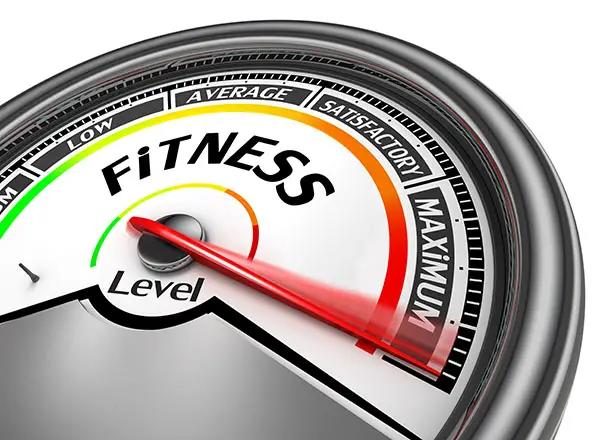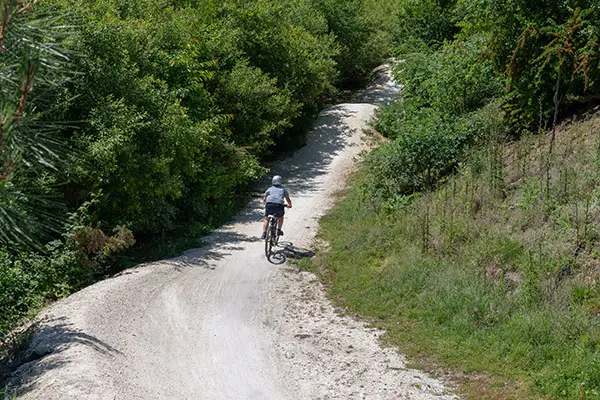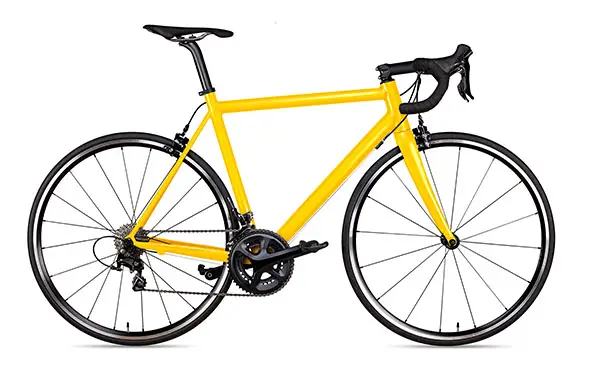Contents
Considering biking as a new hobby? Or maybe you’re looking at getting back into it, but you aren’t sure where to start? No matter the reason, biking is a great source of exercise. Today, we’ll be exploring how long does it take to bike 10 miles, which is a great goal for cyclists at any stage in their journey. But, before we jump in, let’s look at the benefits of biking and why 10 miles seems to be such a magical distance for bikers.
Benefits of Biking
If you’re new to biking, you may not be aware of all the amazing benefits that are associated with it. Biking puts your entire body to work in a way that can improve your stamina, strengthen your muscles and bones, and improve your heart’s health and functioning. Not to mention, it’s great for your butt and other key muscle groups.
Whether you want to incorporate cycling as a form of cross training or you want to pursue mountain biking as a new hobby, you’re bound to experience a great number of benefits.
 Why 10 Miles?
Why 10 Miles?
You may wonder, why is 10 miles a good starting number? Well, it’s great for many reasons. First, it’s a popular distance that many bikers ride. The reason it’s so popular is that it’s achievable, but not too easy. It’s a great starter goal to get you going, but it’s also a great goal to keep you going. Some bikers even make it a goal to go biking 10 miles a day, which is something you could eventually build up to.
How Long Does It Take To Bike 10 Miles?
So, biking is great for your health and biking 10 miles is a great starting goal to get you going, but the question remains… How long does it take to bike 10 miles?
While there is a general estimate, there are several factors that will influence your biking speed and overall time. With that being said, most beginning cyclists could achieve 10 miles in about an hour, averaging 5-7 minutes per mile. But this could drastically change depending on the following factors…

Fitness Level
Your fitness level plays a big role in how long it will take you to bike 10 miles. If you are physically fit and this is something that you do frequently, you could easily complete 10 miles in around 45 minutes or less. But there is more to your fitness level than just your endurance.
Is your fitness related to cardio and biking? Are your legs strong and worked out frequently? Is your heart healthy and strong, or do you need to take it slow? Your fitness level plays a big role in your overall time! So, if you’re just starting out and your fitness level isn’t where you want it to be, give yourself grace and know that it will take you longer in the beginning.
Topography
Even if you are in tip-top shape, the environment that you’re biking in could affect the time you take to bike 10 miles. Here are some things about your topography that you must consider when estimating your time:
Elevation Changes
While it’s so fun to go downhill on a bike, I’m sure you’re familiar with the saying, “What goes up, must come down.” In the biking world this means, if you’re enjoying a fun downhill, chances are you’ve experienced a big uphill or you’re about to! This can definitely affect your time as it uses a lot more energy as opposed to a flat road!
Are there potholes where you’ll be riding? Is it smooth pavement or will there be loose gravel? The more unavoidable obstacles, the more you must be prepared to repair a flat tire which will definitely affect your time!
Busy Area
Another thing to consider is whether the location you are headed is heavily frequented. If you’re on a road, do cars frequent this road, or is it relatively empty? If you’re mountain biking, is it a trail that people can also take on foot? If so, you won’t be able to go all out. The busier the area, the slower, more cautious, and more alert you must be.
Your Bike
Your bike will be another determining factor in your speed and here are the two biggest ways it can affect you…
 Bike Type
Bike Type
Is your bike a heavy mountain bike with big tires? Then, it will be harder to maneuver, making you a little slower. If you have a lighter road bike with super thin tires, you will fly!
There are also bikes that only have one gear. They call these types of bikes fixed-speed. If your bike is a fixed-speed, then your time will greatly be affected, especially if your elevation changes a lot on your route.
Bike Fit
Does your bike fit your body size correctly? If not, it might negatively affect your bike ride. If you’re just starting out, this is something you’ll have to work with for the time being, but if biking is something that you want to pursue, then you’ll need to look into finding a properly fitted bike to help with your speed and your overall comfort!
Biking Gear
Many cyclists who are just starting out may not realize the importance of having proper biking gear, especially the gear that you’ll need “just in case”. Failure to carry some of these might make your biking trip a lot longer if you have a flat or run across an issue with your chain. If you want to ensure you can get your 10 miles in quickly and efficiently, consider having the following handy…
Tire Inner Tube
If you know your ride is going to be a little rocky or there are some uneven surfaces in your future, it’s always better to be safe than sorry and bring a spare tire inner tube along! Maybe it’s a little inconvenient, but it’d be even more inconvenient having to walk your bike home for miles on end.
SCK 2 Pack 20 Inch Bike Tubes Plus 2 Tire Levers


Multi-Tool
This is a great item that is compact and can fit in the back pocket of your bike shirt. You might need a multi-tool on the road to adjust a bike seat, handle bars or to fix a broken chain among other things.
Crankbrothers M19 Multi-Tool + Case


Air Pump
You’d be surprised at how compact air pumps can be these days! In an ideal situation, you wouldn’t have to worry about a flat tire, but on the off chance you do, it’s a worthwhile investment so you can get your bike fixed up quickly and get back to riding!
Vibrelli Mini Bike Pump & Glueless Puncture Repair Kit


Water Bottle
A water bottle is essential for any run, but it’s especially important for longer distances and in hotter temperatures. If you’re going out and buying one, make sure that it fits in your bike’s bottle holder.
CamelBak Podium Chill Bike Water Bottle


Sunglasses
You may be thinking sunglasses are only necessary for days where the sun is blaring, but you’re wrong! Of course, sunglasses are great for protecting your eyes from the sun, but in the biking world, they take on a whole new meaning! Sunglasses are great at protecting your eyes from bugs! That’s right. Bugs. If you’re flying down a hill and a little fly doesn’t see you coming, it’d be very unfortunate for it to hit you right in the eye.
Are the chances of a bug hitting you in the eye high when biking? No. If a bug were to hit you in the eye, would it potentially cause you to crash? Yes. Better be safe and bring your sunglasses!
Under Armour Adult Igniter 2.0 Sunglasses


Rain Gear
Be sure to check the forecast before you head out on your 10-miler, but if there’s a slight chance of rain, be prepared. The roads are going to get a little slick, and you’re going to need to be fully focused. Having proper rain gear will help you be more focused and get you home from your ride safely.
BALEAF Waterproof Cycling Jacket


 Weather
Weather
In understanding how long it will take to bike 10 miles, weather can make or break your time. For example, if it is a clear day, weather won’t really be a factor. But, if it has been rainy or will rain during your ride, the roads and terrain will be slick, which could potentially lead to an unfortunate crash. During this weather, you’ll have to be more vigilant and focused, taking your time.
The temperature can also affect how quickly you can accomplish your 10 mile ride. If it’s going to be hot with high humidity, you’re going to not only need more time, but you’ll also need to be sure you’re taking adequate breaks.
Rest Breaks
Depending on the above factors, especially your fitness level, hot temperatures, and the amount of elevation gain, some bike rides will require more water and rest breaks than others.
According to Flowater, it is recommended that during a 60-minute workout session, you should try to work in 2-3 water breaks to prevent dehydration. Along with this, if the elevation is more than you’re used to, you may also need to think about a rest break. Either way, rest and water breaks are definitely something you’ll need to consider when determining how long it’ll take you to bike 10 miles.
Biking More than 10 Miles
Another great reason to figure out how long it takes to bike 10 miles is that it will help you estimate what it will take to bike other distances. For example, if it took you 50 minutes to bike 10 miles in good weather through your neighborhood, you could estimate that it will take you 75 minutes to bike 15 miles. While it isn’t a perfect science by any means, it’s a helpful tool nonetheless!
But, can you use it as an estimate of how long it will take to bike much longer distances? For example, 75 or 100 miles? Well, you could. It just wouldn’t be very accurate. The farther you go, the more tired you will become. This will bring on more breaks, your speed slowing, and your mental toughness waning. The farther you go from your 10 mile time, the less exact, and frankly correct, your estimation will be. So, if you’re estimating how long it will take you to go for a ride, do so with caution and don’t hold yourself too closely to your estimation.
Conclusion
While the average person records biking 10 miles in around 60 minutes, there are so many different factors that go into your time. When you’re getting ready to go on your ride and your partner asks, “When will you be home, dear?” be sure that you take into account all of the different factors we’ve listed so that you can be as close to accurate as possible! When in doubt, account 5 extra minutes for the unexpected, and you’ll be golden!
No matter how long your 10 miles takes you, it’s a great step in the right direction in your fitness journey! As you practice and grow in experience, your time and your fitness will grow as well!Table could not be displayed.
